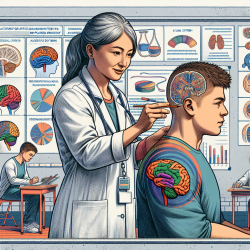Introduction
Sleep is a crucial component of overall health, particularly in children whose brains are still developing. Recent research highlights the importance of sleep quality in enhancing neuropsychological recovery and reducing cognitive impairment. The study titled "Sleep Quality Improvement Enhances Neuropsychological Recovery and Reduces Blood Aβ42/40 Ratio in Patients with Mild–Moderate Cognitive Impairment" provides valuable insights that can be applied to improve therapeutic outcomes for children.
The Study's Findings
The study conducted a longitudinal analysis on patients with mild to moderate cognitive impairment due to Alzheimer's disease, focusing on those with sleep-disordered breathing (SDB). Results showed that improving sleep quality significantly enhanced neuropsychological scores and reduced blood levels of Aβ42/40 ratio and Tau-pT181 proteins, which are biomarkers associated with Alzheimer's disease.
Key findings include:
- Improved sleep quality correlated with better neuropsychological scores.
- Reduction in blood Aβ42/40 ratio and Tau-pT181 levels was observed.
- Patients with complete recovery in sleep quality showed significant improvements in cognitive assessments.
Implications for Practitioners
For practitioners working with children, these findings underscore the importance of prioritizing sleep quality in therapeutic interventions. Here are some strategies that can be implemented:
- Assessment of Sleep Quality: Regularly assess sleep patterns using tools like the Pittsburgh Sleep Quality Index (PSQI) to identify potential sleep issues early.
- Incorporate Sleep Education: Educate children and their families about the importance of sleep and establish healthy sleep routines.
- Multidisciplinary Approach: Collaborate with healthcare providers to address sleep disorders, such as SDB, that may impact cognitive recovery.
Encouraging Further Research
While the study provides significant insights, further research is needed to explore the direct application of these findings to children. Practitioners are encouraged to contribute to this growing field by conducting studies that focus on the pediatric population, examining the relationship between sleep quality and cognitive development.
Conclusion
Improving sleep quality is a promising avenue for enhancing cognitive recovery in children. By integrating sleep assessments and interventions into therapeutic practices, practitioners can potentially improve outcomes for children with cognitive impairments. For those interested in delving deeper into the original research, the study can be accessed here.










